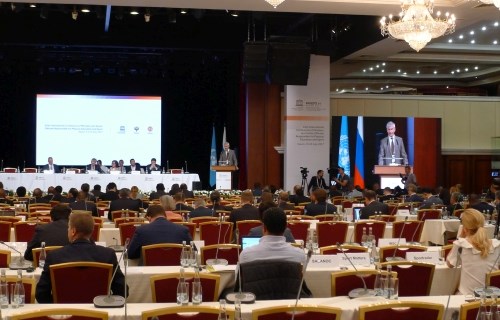116 countries agree on new international action plan
With an ambition to strengthen sport’s integrity, inclusivity, and its contribution to the UN goals for sustainable development, 116 member countries of the UNESCO endorsed the ‘Kazan Action Plan’ at the end of the sixth International Conference of Ministers and Senior Officials Responsible for Physical Education and Sport, MINEPS VI.
The action plan, which is named after the host city of the conference, Kazan in Russia, encourages the countries to acknowledge 20 political goals grouped in three main policy areas:
- Developing a Comprehensive Vision of Inclusive Access for All to Sport, Physical Education and Physical Activity
- Maximizing the Contributions of Sport to Sustainable Development and Peace
- Protecting the Integrity of Sport
Among the specific political goals are the enforcement of gender equality, the fostering of inclusive participation and the establishment of multi-stakeholder partnerships. Moreover, the action plan links sport and physical education to the UN Agenda 2030 on sustainable development goals by pointing at how sport can contribute to improved health and well-being, city environments, safe and inclusive societies, and other sustainability factors.
Finally, the Kazan Action Plan lists five political goals on the integrity of sport: It highlights the need to ensure and strengthen the combat against doping and match-fixing, and to foster good governance among sports organisation. Moreover, it establishes the responsibility of governments to safeguard athletes, spectators and workers as well as to protect children, youth and other vulnerable groups.
A last-minute Russian attempt to establish it as a right for all athletes to refuse to compete under the neutral flag didn't succeed.
The President of the Russian Olympic Committee, Alexandr Zhukov, argued that it was unfair that young Russian athletes had to participate under a neutral flag in international athletics competitions after the international athletics federation, IAAF, suspended the Russian athletics federation due to systematic doping use in Russian sport.
Three simple steps to go forward
The international director of Play the Game, Jens Sejer Andersen, was as one of the keynote speakers invited to talk about the integrity of sport.
In his speech, he warned that often understaffed and underfunded governmental offices working with sport will not be able to “regulate every little detail on their own, from the level of professional Olympic sport to the rugged playground in the local village”.
Instead, he recommended that governments take three relatively simple steps to improve the integrity of sport:
Firstly, he suggested that governments should engage all local stakeholders in shaping a national strategy for sport, including the integrity issues. Secondly, governments could to re-distribute the public grants, so they reflect the outcomes of the adapted strategy and link the grants to criteria for good governance in the supported organisations.
Finally – and this was crucial, according to Andersen – governments must make sure that the public debate on sport is truly open and welcomes the best facts, the best scientific data, and the best personal experiences available – even when truth is inconvenient, as he stressed.
“The integrity agenda that may seem as a routine today would simply not exist without brave men and women who put their career, their reputation and their personal safety at risk in order to tell the truth,” he said to 400-plus participants of the conference.
“These are the unsung heroes who have shown the rest of us the true picture of the challenges around us. Without them, we would not know the reality on the ground and we would be fumbling in the dark. This is why encouraging media freedom, independent voices and whistle-blowers has been and will continue to be essential for a successful sports policy.”
Action plan to uphold the pace
To outsiders, the action plan may seem a bit convoluted with its references to earlier declarations and policy documents, and it covers a broad range of policy areas. But several countries expressed an intension to let the Kazan Action Plan be a guideline for their own sports policies.
How many countries will follow all the recommendations – and to what degree – is still an open question. As a representative of Benin said when he called for a more committing process in the future, good ideas and recommendations tend to be forgotten as soon as the meeting is over – rather than being implemented. A non-binding paper does not guarantee change by itself.
However, in contrast to earlier international conferences, the Kazan Action Plan also commits UNESCO to taking five concrete steps in co-operation with a broad range of stakeholders in sport from governmental and inter-governmental institutions to sport organisations, universities and NGOs. The actions aim at collecting and disseminating arguments and evidence supporting the political objectives.
More concretely they ask UNESCO and it partners to:
- Elaborate an advocacy tool presenting evidence-based arguments for investments in physical education, physical activity and sport.
- Develop common indicators for measuring the contribution of physical education, physical activity and sport to prioritized SDGs and targets.
- Unify and further develop international standards supporting sport ministers’ interventions in the field of sport integrity (in correlation with the International Convention against Doping in Sport).
- Conduct a feasibility study on the establishment of a Global Observatory for Women, Sport, Physical Education and Physical Activity.
- Develop a clearinghouse for sharing information according to the sport policy follow-up framework developed for MINEPS VI.
Among other key partners, Play the Game is mentioned in the action plan as a possible contributing organisation in the development of international standards in the field of sport integrity.







An excellent outcome for this round, research, insight and impact are clearly necessary to drive this agenda